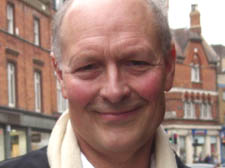|
|
 |
| |

Philip Hodson |
‘Opposites attract? It’s not that simple’
An agony uncle with almost 40 years’ experience giving advice to ‘slightly embarrassed men’ Phillip Hodson talks to Peter Gruner about the challenges facing modern relationships
How Perfect is Your Parter?
By Phillip Hodson. Carroll & Brown £12.99.
BRITAIN’S foremost agony uncle Phillip Hodson recalls the very first time he ever gave advice. It was in the early 1960s, to a fellow young Oxford University student who was depressed because he couldn’t make love to his girlfriend.
Phillip, 63, smiles fondly as he remembers the event, more than 40 years ago. We’ve met at his favourite tea shop. Louis Patisserie in Heath Street, Hampstead, to discuss his book about relationships, How Perfect is Your Partner?, recently reprinted here and published for the first time in the US.
Phillip says the young man had confided in him one day that he had a tight foreskin.
“He was a very bright student, but was too embarrassed to see a doctor,” he recalls. “So I spoke to my own doctor about the problem. He told me the young man needed an adult circumcision. The student had the operation, went on to make love to his girlfriend and get a star first in his studies. He was very grateful to me.”
After leaving Oxford Phillip became, at 27, one of Britain’s youngest marriage guidance counsellors, although being single he’d had no actual experience of that partnership. It was the beginning of a career that was to launch him into being a sex therapist and psychotherapist.
He points out that while men desperately need more advice and support than ever before, there are still very few agony uncles.
“Women have got their act together,” Phillip says. “They don’t need a man to decide anything, whereas men still expect the male chauvinist empire to be reinstated and women to come along and clean up for them.
“But unless men are prepared to develop more feelings-based skills they won’t keep their partners. And men without partners are prey to far more ill-health than those with them.”
He believes that it is no surprise that more men are killing themselves and sometimes also their own children.
“Until men are prepared to deal with their emotions,” he says, “rather than explode and punch someone in the street, then this will continue. Men have got to admit to anxiety and fragility and be prepared to go and see their doctor if they have a problem.”
Phillip says that in the competitive world of agony advisers he regularly suffers from sex discrimination.
“I’m trying to work in what is effectively a woman’s world,” he adds. “I’ve even been called an agony aunt. Recently the BBC’s Women’s Hour asked me to do a talk on cancer sufferer Jade Goody. An hour later I got a call saying: ‘Sorry, but the producer wants a woman’.”
Phillip says he agreed to write the book because so many marriages and partnerships are going wrong and people are making the same mistakes generation after generation.
“The important question is not whether you have rows but how you manage them. It almost boils down to how good an apologiser you are for your bad behaviour.
“One doctor has worked out that you need to give five bits of praise or ‘good strokes’ for every major row you have.”
Phillip advises warring partners to find time to talk but pick a moment when they are not worn out. “At all costs don’t ‘stonewall’ or refuse to have a discussion at all,” he says. “Practise active listening – one person goes first and the other listens without interruption. Actively look for a deal or compromise.”
Interestingly, he suggests many couples deal with their differences as if it they were in the workplace.
“Remember, the aim is not to try and win. If you ‘win’ the relationship loses. This highlights a big difference between the worlds of work and home.
“In business, the idea is to win a contract, sell at a profit, and beat the other person to the job. The essence of capitalism is competition. But if you live by the same values within your family you will destroy your relationship.”
The book is colourful, occasionally frivolous but always informative and easy to read. It has a foreword from his partner of 30 years, sex therapist and writer Anne Hooper.
While admitting there have been “storms as well as sunshine” in their relationship, Ms Hooper writes: “Phillip’s methods have definitely worked for me. The man I love has taught me a great deal during this time but I hope and presume that he has learned something from me too. “
•
Hodson’s 20-point checklist for a perfect partnership
1 Being able to say sorry – the next day.
2 Being able to wait for the other person to say sorry – the next day.
3 Having genuine common interests, similar quirks, complementary vices, and virtues.
4 Wanting the other’s good opinion.
5 Enjoying mutual silence/time off.
6 Giving permission to say the unpopular or voice anxieties.
7 Giving verbal encouragement always.
8 Reading the other’s moods.
9 Taking second place often enough.
10 Being given first place often enough.
11 Learning each other’s skills – work/domestic – so each is the other’s back-up.
12 From day one, sorting out money issues.
13 Making criticism constructive/using assertion skills – ‘I’d prefer this... I won’t tolerate that.’
14 Touching – especially when things are difficult.
15 Planning and having fun.
16 Being open-minded about new ideas or adaptable to change (age / outlook / capacity / habit) at roughly the same rate or ratio.
17 Dragging a problem out by the teeth when necessary to move on.
18 Respecting the other’s family – within reasonable limits.
19 Being forgiving.
20 Learning how to enjoy domestic life – since we all end up in an armchair eventually. |
|
|
 |
 |
|
 |
|


